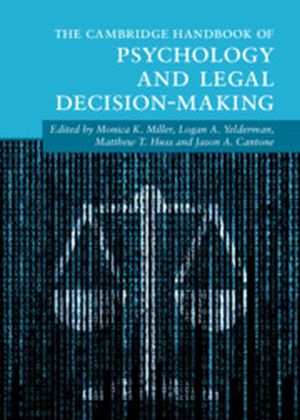
Presenting state-of-the-art research, this Handbook summarises emerging and establishing topics in the area of legal decision-making. Interdisciplinary in its approach, it covers decisions made within the criminal justice system, the trial process, and clinical settings. Chapters, written by accomplished academics and experts in the field, synthesize historical context, identify gaps in existing literature, propose future directions of study, and discuss policy limitations. It also includes 'perspectives from the field' essays written by professionals – a judge, an attorney, a police officer, a trial consultant, and a probation officer – to bridge the gap between academic research and its application to the real world. It is intended as a go-to resource for students and researchers who want to immerse themselves in a body of scientific research to understand its history and shape its future.